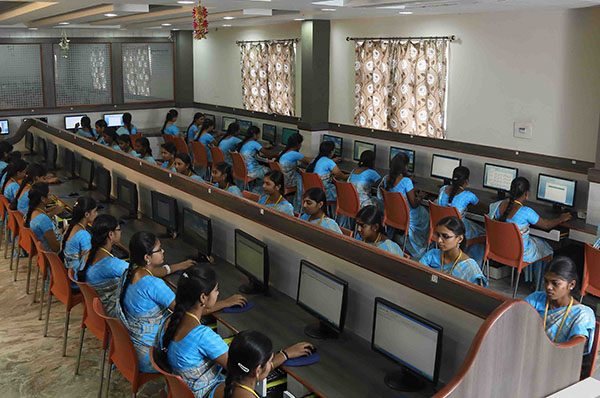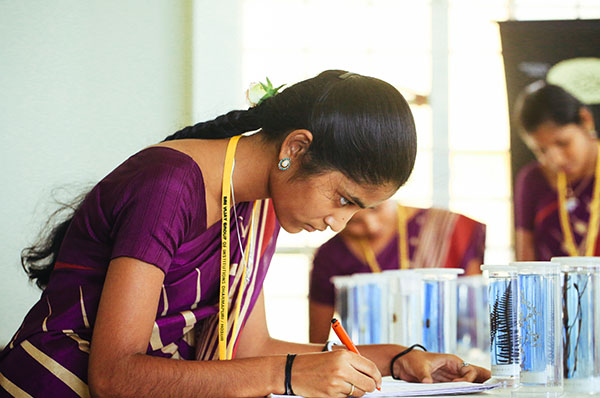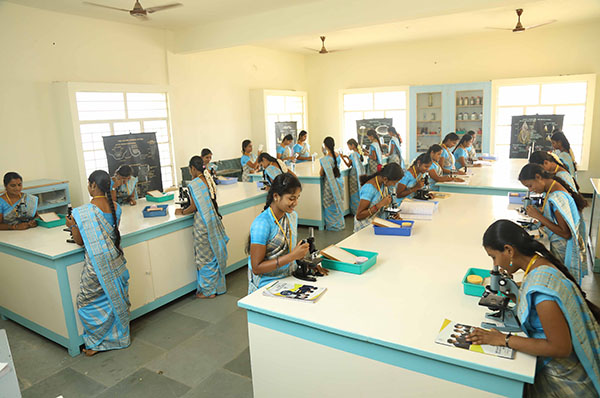Laboratories
Computer Lab
The college has established 2 computer laboratories with a total of 120 computers with a vision of providing ICT exposure to all students. Every workplace on the campus, including faculty rooms, offices, student residence rooms, computer labs, library and administrative office, has network connectivity.
The computing resources include advanced servers and powerful workstations. A state-of-the-art campus network with fiber optic backbone and a 15 Mbps Leased line Internet connection offer unlimited access of Internet for the students and staff round the clock, for their educational and research needs.
Round the clock access to computer lab.
Internet browsing and e-mail facilities are available.
Variety of software packages is available.
Each student has accompanied with an individual computer.
Wi-Fi facility is also available.


Chemistry Lab
- Providing better practical knowledge to the students is the goal of our chemistry department’s modern laboratories.
- The laboratory of the Chemistry department is fully equipped with the latest laboratory equipment for conducting practical experiments and conducting research.
- We have a well-equipped research lab with Double beam UV Spectrophotometer.
- We have well-organized three major laboratories for undergraduate and postgraduate students, and facilities for allied students.
- Some of the equipment are Electronic balance, Electric Burner, Hot Air Oven, Distillation Unit, Two bed Demineralizer, Potentiometer, Conductivity Meter, Photo Colorimeter, pH Meter, Suction pump, Centrifuge Machine, Electrical water bath, Shaker Machine, Melting apparatus, Heating mantle, Magnetic Stirrer with heating conditions, Exhaust fan, Hot Plate, Digital potentiometer, Digital conductivity meter etc…
Botany Lab
Our College Botany lab is well equipped for undergraduate and postgraduate students to perform various botany practical which are necessary for the study of the structure, properties, and biochemical processes of all forms of plant life, as well as plant classification, plant diseases, and the interactions of plants with their physical environment. The laboratory is spacious, well ventilated and are equipped with the necessary instruments such as Dissecting microscopes, compound microscopes, Binocular metallurgical microscope, UV vis spectrophotometer, colorimeter, centrifuge machine, heating mantle, air sampler, hygrometer, camera lucida, micro meter, haemocytometer, soxhlet apparatus, autoclave, microtome, respirometer, botanical charts and specimens.
Our Botany Laboratory has 100 preserved plant specimens for studying botanical names and identifying the particular plant in the field. Botany laboratory contains 10 experimental instruments to study the sectioning of Plants, centrifugal process and some physiological experiments like transpiration, Oxygen evolution, and Seed germination. The exclusive experiments are carried out by using equipments like Auxanometer, Ganong’s Photometer, Kuhnes fermentation apparatus, clinical and ultra centrifuges, Shakers, Wiltman’s light screen apparatus etc. Our Laboratory also possesses 50 types of economically important Medicinal Plant products. For the preparation and storage of Herbarium of common plants, a separate place is maintained. There is a Botanical Garden as additional assets to Botany Department.


Microbiology Lab
The basic objectives of a microbiological research laboratory can be defined as follows:
- Protection of the experimenter and staff.
- Protection of the surrounding community.
- Maintenance of experimental validity.
SEGREGATION OF AREAS
- Clean and transition
- Research area
- Animal holding and research area
- Laboratory support
- Engineering support
- Phillips and Runkle propose the primary-secondary barrier concept.
- Laboratories need to develop techniques to manage areas of high microbial populations. Below are some points to consider in relation to maintaining a hygienic environment.
- In designing a microbiology laboratory, it is important to keep in perspective the nature of the microorganisms, the potential sources of cross-contamination, the nature of the test materials, as well as the regulatory requirements in the industry. The generation and collection of data is key to ensuring product quality and ultimately patient safety.
- See this recent article discussing pharmaceutical laboratory designand good manufacturing practices.

